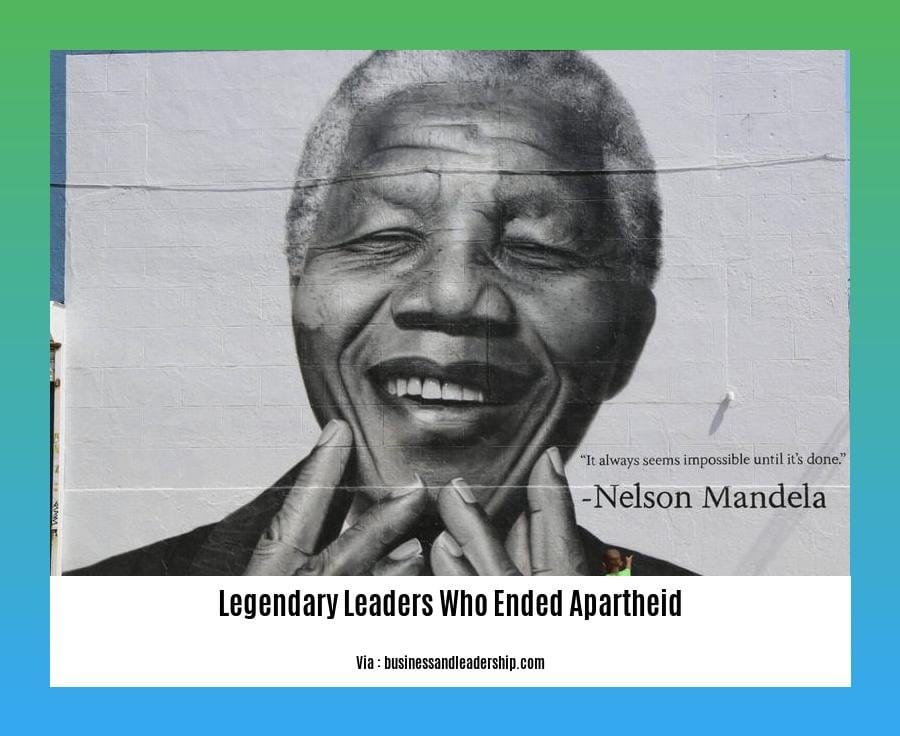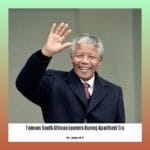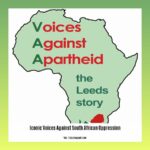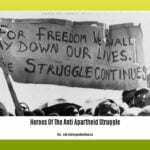Prepare to be inspired by the extraordinary journeys of the legendary leaders who spearheaded the movement to end apartheid in South Africa. Their unwavering resolve and strategic brilliance illuminated the path towards a more just and equitable society, forever leaving an indelible mark on history. Join us as we delve into their stories of courage, determination, and unwavering commitment to human rights in “The Legendary Leaders Who Ended Apartheid: Their Unwavering Resolve and Impact.”
Key Takeaways:
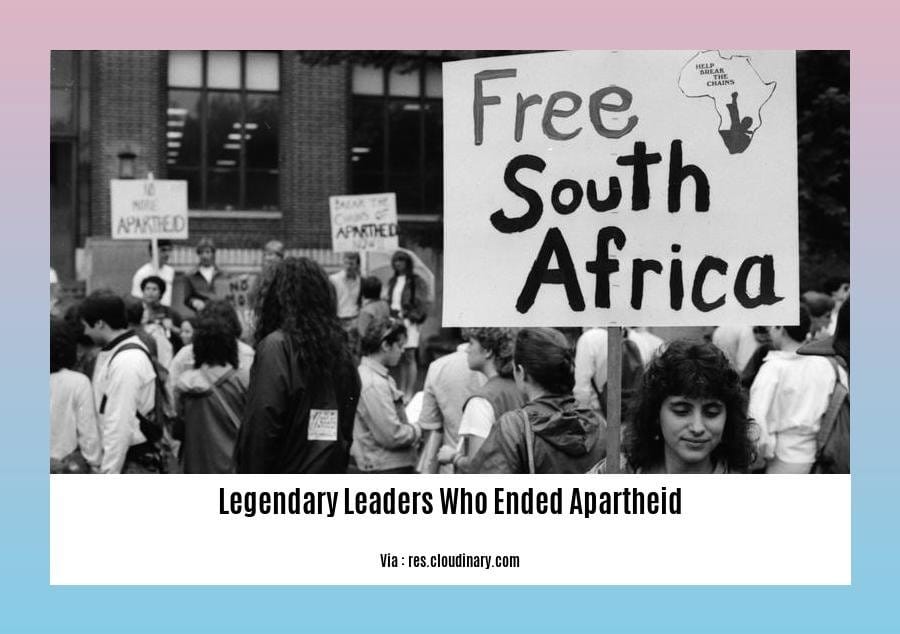
- International pressure and the fall of the Berlin Wall contributed to the release of Nelson Mandela.
- The 1976 Soweto protests highlighted the brutality of apartheid.
- Key leaders such as Mandela, F.W. de Klerk, and Desmond Tutu played crucial roles in ending apartheid.
Legendary Leaders Who Ended Apartheid
The fight against apartheid was a long and bloody one, but it was ultimately successful thanks to the efforts of a number of legendary leaders. These leaders came from all walks of life, but they shared a common goal: to end the system of racial segregation that had held South Africa in its grip for so long.
Nelson Mandela, the leader of the African National Congress (ANC), was one of the most iconic figures in the anti-apartheid movement. He was imprisoned for 27 years for his role in the struggle against apartheid, but he never gave up hope. When he was finally released from prison in 1990, he went on to become the first democratically elected president of South Africa.
Desmond Tutu, the archbishop of Cape Town, was another key figure in the anti-apartheid movement. He was a vocal critic of apartheid, and he used his position to speak out against the injustices of the system. He was awarded the Nobel Peace Prize in 1984 for his work in the anti-apartheid movement.
F.W. de Klerk, the last president of South Africa under apartheid, played a key role in the negotiations that led to the end of apartheid. He released Mandela from prison and lifted the ban on the ANC. He was awarded the Nobel Peace Prize in 1993 for his role in the transition to democracy.
These are just a few of the many legendary leaders who played a role in the fight against apartheid. Their courage and determination helped to bring about the end of one of the most oppressive regimes in history.
Explore the influential roles played by famous South African leaders who fought against the oppressive apartheid regime. Learn about the anti-apartheid leaders who dedicated their lives to dismantling the system and promoting equality. Discover the influential voices that spoke out against the injustices of apartheid and inspired change.
F.W. de Klerk: The Last Apartheid President
F.W. de Klerk, South Africa’s final apartheid-era president, played a pivotal role in dismantling the oppressive system that had plagued the nation. His actions, marked by both courage and pragmatism, earned him a Nobel Peace Prize and a place among the legendary leaders who ended apartheid.
Key Takeaways:
Negotiated Transition: De Klerk initiated negotiations with Nelson Mandela and anti-apartheid groups, paving the way for the end of apartheid and peaceful transition to democracy.
End of Apartheid: He lifted the ban on the ANC and released political prisoners, including Mandela, setting the stage for free elections.
Nobel Peace Prize: De Klerk shared the 1993 Nobel Peace Prize with Mandela for their efforts to peacefully end apartheid.
Controversial Legacy: Despite his role in ending apartheid, De Klerk’s legacy remains complex, with some criticizing his past involvement in the apartheid regime.
Citation:
Apartheid: The Legendary Leaders Who Fought for Freedom
Apartheid, a system of racial segregation and discrimination, once plagued South Africa, leaving an indelible mark on its history. However, amidst the darkness, legendary leaders emerged, their unwavering resolve igniting a flame of hope and leading the nation towards liberation.
Nelson Mandela: The Unconquerable Spirit
Nelson Mandela, the iconic leader of the African National Congress (ANC), spent 27 years behind bars for his resistance against apartheid. Yet, his spirit remained unbroken, and upon his release, he became South Africa’s first democratically elected president. Mandela’s legacy as a symbol of resilience and forgiveness continues to inspire worldwide.
Desmond Tutu: The Voice of Conscience
Archbishop Desmond Tutu, a Nobel Peace Prize laureate, fearlessly denounced apartheid. His powerful sermons and unwavering advocacy brought global attention to the injustices faced by South Africa’s Black population. Tutu’s legacy as a voice for the voiceless remains a testament to the power of speaking truth to power.
F.W. de Klerk: A Catalyst for Change
F.W. de Klerk, the last apartheid president, played a pivotal role in dismantling the oppressive regime. He released Mandela from prison, unbanned the ANC, and initiated negotiations that culminated in a peaceful transition to democracy. De Klerk’s willingness to compromise paved the way for a new era in South African history.
Key Takeaways:
- The fight against apartheid was a collective effort, led by courageous individuals who risked their lives for a just cause.
- Nelson Mandela, Desmond Tutu, and F.W. de Klerk each played a unique role in dismantling the oppressive system.
- Their unwavering resolve and dedication to human rights serve as a reminder of the power of leadership in shaping history.
Most Relevant URL Source:
- The Anti-Apartheid Movement – The Most Famous Leaders and Activists
African National Congress (ANC)
The African National Congress (ANC) is a South African political party that has played a leading role in the fight against apartheid. The ANC was founded in 1912 as a Black nationalist organization, and it quickly became the leading voice for Black South Africans. The ANC’s mission was to fight for the rights of Black South Africans and to end apartheid.
The ANC’s fight against apartheid was long and difficult. The ANC was banned by the apartheid government, and its leaders were imprisoned or exiled. But the ANC never gave up, and it continued to fight for the rights of Black South Africans.
In 1994, the apartheid government finally collapsed, and the ANC was elected to power. The ANC’s victory was a major victory for the people of South Africa, and it marked the beginning of a new era of democracy and freedom.
Key Takeaways:
- The African National Congress (ANC) was founded in 1912 as a Black nationalist organization.
- The ANC led the fight against apartheid in South Africa.
- The ANC played a key role in the negotiations that led to the end of apartheid.
- The ANC remains a major political party in South Africa today.
Most Relevant URL Source:
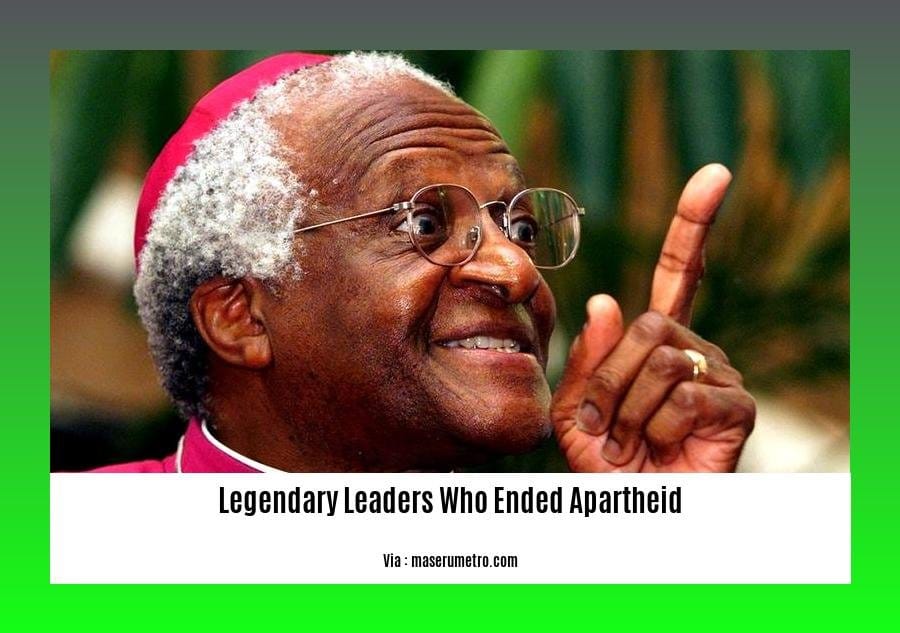
FAQ
Q1: Who were some of the most influential leaders in the anti-apartheid movement?
A1: Key leaders who played a role in ending apartheid include Nelson Mandela, F.W. de Klerk, and Desmond Tutu, among others.
Q2: What were some of the key steps that led to the end of apartheid?
A2: Important steps that led to the end of apartheid include the South African Resistance, international pressure to release Mandela, the fall of the Berlin Wall, and Mandela’s release, among others.
Q3: What was the significance of the 1976 Soweto protests?
A3: The 1976 Soweto protests drew international attention to the brutality of apartheid and marked a turning point in the anti-apartheid movement.
Q4: What role did the African National Congress (ANC) play in the anti-apartheid movement?
A4: The ANC, founded in 1912, led the fight against apartheid in South Africa, played a key role in negotiating the end of apartheid, and remains a major political party in South Africa today.
Q5: What was F.W. de Klerk’s role in ending apartheid?
A5: F.W. de Klerk, who served as president from 1989-1994, played a pivotal role in dismantling the apartheid system of racial segregation and leading South Africa to its first multiracial democratic election in 1994.
